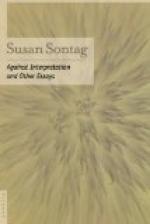|
This section contains 800 words (approx. 2 pages at 400 words per page) |

|
Summary
Sontag begins the first essay of Part I, "Against Interpretation," by observing that the entirety of Western reflection on art remains beholden to Greek theories, namely the theory of mimesis and representation. Philosophers like Plato and Aristotle, for example, suggest that art is essential mimetic, i.e., that it is an "imitation of reality" (3). Such a theory makes art problematic and in need of defense, according to Sontag. Because any given work of art is taken to be merely an imitation or representation (and thereby not really real) the question of why art is needed at all emerges. Sontag argues that this problem leads to an unnecessary bifurcation between form and content whereby the latter is always privileged over the former-the art is assumed to be the content and form is left aside.
This emphasis on content over form necessitates the incessant work of...
(read more from the Part 1 Summary)
|
This section contains 800 words (approx. 2 pages at 400 words per page) |

|




